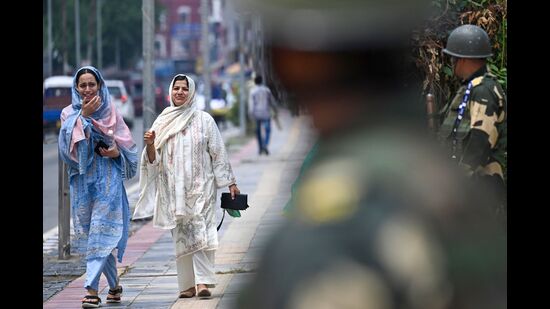The Election Commission (EC) has finally declared dates for the long-delayed assembly poll in Jammu and Kashmir (J&K). After 10 long years, the people of the erstwhile state will have an elected administration. That fact alone should be cause for celebration.

But there’s a rub. The elected administration will have only limited authority since the Union administration recently assigned key powers to the lieutenant governor (LG), including over the police, appointment and transfer of civil servants, sanction to prosecute, and even finances. The new rules under Section 55 of the Jammu and Kashmir Reorganisation Act lay down that the LG’s decisions cannot be reviewed by the council of ministers. His representative will attend all Cabinet meetings. Even the ministers’ schedules and/or agendas of meetings will have to be submitted to his office at least two days earlier. In other words, the people of J&K, much like the people of Delhi, will have the right to vote for an administration, but they will not be fully governed by the administration they elect.
Critics of the new rules point to their vice-regal quality. Whether they are constitutionally valid is questionable. In the case of Delhi, the Supreme Court (SC) ruled last year in April that the bureaucracy served under and was accountable to the elected administration, not the LG. If that rule applies to a Union Territory (UT) which acquired some elements of statehood, it applies to Jammu and Kashmir, which was a full state with an elected administration until it was divided and demoted to a UT. Can a Delhi-type formula be applied to a former state even if, as solicitor general Tushar Mehta stated, it would be a temporary measure towards full statehood?
That question is yet to be brought up before the court. In the meantime, LG Manoj Sinha has said that he will endeavour to work with the elected administration, though he has stopped short of saying that he will act on the advice of the council of ministers. Possible sources of friction include security strategies that alienate residents, human rights and the misuse of legislation — an issue that the J&K high court has also recently highlighted — controversial land acquisition and economic development policies, and the independence of the media, to mention a few. Much depends on how Sinha or his successor, since his term ends in August 2025, will deal with the elected administration on these issues.
Just a day before the EC announced the assembly poll dates, Sinha’s administration transferred close to 200 civil administrators and police. The transfers appear to be in response to the EC’s order that poll-bound states post officers out of their home districts, but both the National Conference’s Omar Abdullah and the Progressive Democratic Party’s Mehbooba Mufti have voiced suspicion that they will benefit the Bharatiya Janata Party and its allies. The former has requested the EC to examine the new postings.
While announcing the poll dates, which cross the SC’s deadline of the end of September by a day, the EC said that it would ensure a level playing field for all parties to engage in a free and fair election. Whether the large number of transfers conforms to its orders is a question worth examining, if only to put any doubts at rest. For his part, Sinha should not hesitate to discuss the transfers case by case with the representatives of political parties contesting the assembly poll. It would be a welcome gesture of cooperation.
Coming after 10 years in which the erstwhile state underwent massive change, this election and what follows it will be closely watched not only domestically but also internationally, by well- and ill-wishers alike. A key question will be whether it results in improving peace on the ground. It would be naïve to expect such a result immediately — the recent spurt of armed attacks on civilians and security forces, led by Pakistan-based cross-border infiltrators, is unlikely to end just because J&K finally has an elected administration. But an elected administration will play a crucial role in mitigating and even reversing the alienation of the people of the former state by refocusing policy on the rights, welfare and public participation of people.
The experience of the Atal Bihari Vajpayee-Manmohan Singh peace-process years, in which elected state administrations had considerable influence, showed that such a refocusing did succeed in withering local tolerance for armed insurgents. But under the new rules, an elected administration will only be able to play such a role if the LG facilitates it by taking the back seat and, where necessary, intervenes with the Union home ministry to support the elected administration.
Bad as the friction between the LG and Delhi’s Arvind Kejriwal administration is, any friction between an elected J&K administration and the LG will be worse, because it will be noted internationally. It might even provide an opportunity for spoilers in Pakistan to take advantage. That is a danger that must be averted.
One last word. Ladakh will not be going to the polls since it is now a separate UT. But there, too, civil society groups have expressed their desire for an elected administration through the restoration of the executive powers of the hill councils. Why that has not been done is odd, given Ladakh is a sensitive border area over which there are ongoing tensions with China. Public goodwill is both a democratic and a security imperative in Ladakh, just as it is in J&K.
Radha Kumar’s latest book is The Republic Relearnt: Renewing Indian Democracy, 1947-2024.The views expressed are personal


